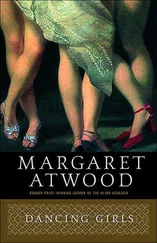He lifted his glasses again and swept the terrain slowly. There was no sign of patrols or hidden skulkers. There must be watchers somewhere, he knew. There were always watchers, alert to the slightest relaxation of the vigilance maintained at Crawford stronghold.
Street by street he studied the sorry houses, with their broken window panes and their peeling paint, still marked by the soap streaks and the gouges and the red-paint splashes inflicted years before. Here and there dead trees stood stark, denuded of their branches. Browned evergreens, long dead, stood rooted in the dusty yards—yards long since robbed of the grass that once had made them lawns.
And on the hilltop, up on Circle Drive, stood the ruins of Thompson stronghold, which had fallen almost five years before. There was no structure standing. It had been leveled stone by stone and board by board. Only the smashed and dying trees, only the twisted steel fence posts marked where it had been.
Now Crawford stronghold stood alone in Oak Manor. Max thought of it with a glow of pride and a surge of painful memory. It stood because of him, he thought, and he would keep it standing.
In this desert it was the last oasis, with its trees and grass, with its summer houses and trellises, with the massive shrubbery and the wondrous sun dial beside the patio, with its goldfish-and-lily pond and the splashing fountain.
“Max,” said the walkie-talkie strapped across his chest.
“Yes, Mr. Crawford.”
“Where are you located, Max?”
“Up on the lookout, sir.”
“I’ll come in on Seymour Drive,” said Mr. Crawford’s voice. “I’m about a mile beyond the hilltop. I’ll be coming fast.”
“The coast seems to be quite clear, sir.”
“Good. But take no chances with the gates.”
“I have the control box with me, sir. I can operate from here. I will keep a sharp lookout.”
“Be seeing you,” said Crawford.
Max picked up the remote control box and waited for his returning master.
The car came over the hill and streaked down Seymour Drive, made its right-hand turn on Dawn, roared toward the gates.
When it was no more than a dozen feet away, Max pushed the button that unlocked the gates. The heavy bumper slammed into them and pushed them open. The buffers that ran along each side of the car held them aside as the machine rushed through. When the car had cleared them, heavy springs snapped them shut and they were locked again.
Max slung the control-box strap over his shoulder and went along the rooftop catwalk to the ladder leading to the ground.
Mr. Crawford had put away the car and was closing the garage door as Max came around the corner of the house.
“It does seem quiet,” said Mr. Crawford. “Much quieter, it would seem to me, than usual.”
“I don’t like it, sir. There is something brewing.”
“Not very likely,” said Mr. Crawford. “Not on the eve of Truce Day.”
“I wouldn’t put nothing past them dirty Punks,” said Max.
“I quite agree,” said Mr. Crawford, “but they’ll be coming here tomorrow for their day of fun. We must treat them well for, after all, they’re neighbors and it is a custom. I would hate to have you carried beyond the bounds of propriety by overzealousness.”
“You know well and good,” protested Max, “I would never do a thing. I am a fighter, sir, but I fight fair and honorable.”
Mr. Crawford said, “I was thinking of the little gambit you had cooked up last year.”
“It would not have hurt them, sir. Leastwise, not permanently. They might never have suspected. Just a drop or two of it in the fruit punch was all we would have needed. It wouldn’t have taken effect until hours after they had left. Slow-acting stuff, it was.”
“Even so,” said Mr. Crawford sternly, “I am glad I found out in time. And I don’t want a repeat performance, possibly more subtle, to be tried this year. I hope you understand me.”
“Oh, certainly, sir,” said Max. “You can rely upon it, sir.”
“Well, good night, then. I’ll see you in the morning.”
It was all damn foolishness, thought Max—this business of a Day of Truce. It was an old holdover from the early days when some do-gooder had figured maybe there would be some benefit if the stronghold people and the Punks could meet under happy circumstance and spend a holiday together.
It worked, of course, but only for the day. For twenty-four hours there were no raids, no flaming arrows, no bombs across the fence. But at one second after midnight, the feud took up again, as bitter and relentless as if had ever been.
It had been going on for years. Max had no illusions about how it all would end. Some day Crawford stronghold would fall, as had all the others in Oak Manor. But until that day, he pledged himself to do everything he could. He would never lower his guard nor relax his vigilance. Up to the very end he would make them smart for every move they made.
He watched as Mr. Crawford opened the front door and went across the splash of light that flowed out from the hall. Then the door shut and the house stood there, big and bleak and black, without a sliver of light showing anywhere. No light ever showed from the Crawford house. Well before the fall of night he always threw the lever on the big control board to slam steel shutters closed against all the windows in the place. Lighted windows made too good a nighttime target.
Now the raids always came at night. There had been a time when some had been made in daylight, but that was too chancy now. Year by year, the defenses had been built up to a point where an attack in daylight was plain foolhardiness.
Max turned and went down the driveway to the gates. He drew on rubber gloves and with a small flashlight examined the locking mechanism. It was locked. It had never failed, but there might come a time it would. He never failed to check it once the gates had closed.
He stood beside the gates and listened. Everything was quiet, although he imagined he could hear the faint singing of the electric current running through the fence. But that, he knew, was impossible, for the current was silent.
He reached out with a gloved hand and stroked the fence. Eight feet high, he told himself, with a foot of barbed wire along the top of it, and every inch of it alive with the surging current.
And inside of it, a standby, auxiliary fence into which current could be introduced if the forward fence should fail.
A clicking sound came padding down the driveway and Max turned from the gate.
“How you, boy,” he said.
It was too dark for him to see the dog, but he could hear it snuffling and snorting with pleasure at his recognition.
It came bumbling out of the darkness and pushed against his legs. He squatted down and put his arms about it. It kissed him sloppily.
“Where are the others, boy?” he asked, and it wriggled in its pleasure.
Great dogs, he thought. They loved the people in the stronghold almost to adoration, but had an utter hatred for every other person. They had been trained to have.
The rest of the pack, he knew, was aprowl about the yard, alert to every sound, keyed to every presence. No one could approach the fence without their knowing it. Any stranger who got across the fence they would rip to bits.
He stripped off the rubber gloves and put them in his pocket.
“Come on, boy,” he said.
He turned off the driveway and proceeded across the yard—cautiously, for it was uneven footing. There was no inch of it that lay upon the level. It was cleverly designed so that any thrown grenade or Molotov cocktail would roll into a deep and narrow bomb trap.
There had been a time, he recalled, when there had been a lot of these things coming over the fence. There were fewer now, for it was a waste of effort. There had been a time, as well, when there had been flaming arrows, but these had tapered off since the house had been fireproofed.
Читать дальше












